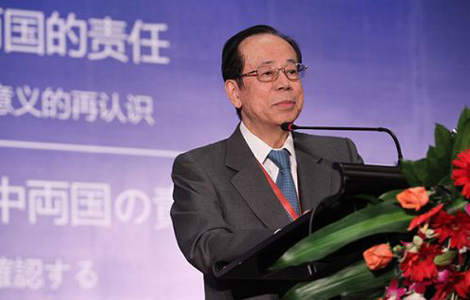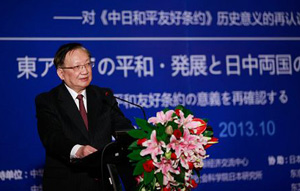Hong Kong's business community steps out of the closet
Updated: 2013-10-29 06:50
By Nigel Collett (HK Edition)
|
||||||||
If you had been standing in Statue Square last Wednesday evening, you would have seen something historic. HSBC's headquarters shed its red and white light display for the first time in its 30-year life and replaced it with the rainbow colors recognized internationally to represent lesbian, gay, bisexual and transgender (LGBT) people. Next day, the bank's Hong Kong CEO, Anita Fung Yuen-mei, explained why. Speaking to the first Asian Leadership Summit organized here by the New York-based NGO, Out on the Street, she said the rainbow lights were intended as a sign that the bank supported LGBT inclusion.
Todd Sears, a gay American financier, founded Out on the Street in 2011, aiming to change attitudes on Wall Street by using commercial arguments. That year, he held his first summit in New York with six major financial houses and since then has held another in the US and a third in London. By the time Sears brought Out in the Street to Hong Kong, its membership had reached 29 major corporations. Barclays took the lead in hosting the fourth summit at the Conrad Hotel.
It was at one of the three summits he attended that Lloyd Blankfein, chairman and CEO of Goldman Sachs, famously responded to the question, "Has Goldman lost business because of your support for LGBT rights and same-sex marriage?" that he didn't care if they had. Blankfein said no one had yet been able to walk him through the case for how discrimination made good business sense.
Blankfein's realization that inclusive policies give a competitive advantage is now one shared by many of Hong Kong's business leaders. A stellar array of those drove home that message at the summit. The hard-headed business executives at the summit neither saw their firms as human rights advocates, nor were prepared to allow anything to deflect them from providing returns for their stakeholders. Instead, their support for LGBT equality in the workplace was motivated by the realization that having equal, inclusive LGBT policies makes money. Here's how.
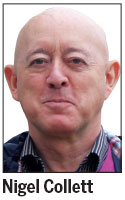
First, it dramatically improves productivity at minimal cost. Bank of America Merrill Lynch calculates that between 5 percent and 10 percent of its staff are LGBT and that these, when forced to hide their orientation or gender identity at work, do so only at a terrible cost in energy and emotion. That leads to a loss of about 30 percent in the productivity they would show were they freed to fulfil their potential. The financial cost of paying large numbers of people to work below their capability can be enormous in an international firm. Treating LGBT employees equally and inclusively leads to an immediate rise in creativity at virtually no cost.
Second, having good LGBT policies is tied closely to making profit. Credit Suisse is now so convinced that good ratings in the Corporate Equality Index (which the New York Human Rights Campaign uses to measure LGBT policies) lead to better corporate profits that they have issued an LGBT Equality Portfolio, which will include the stocks of 20-30 top equality-rated US equities from the S&P 500. They have figures which show that these stocks outperformed the S&P 500 over the years 2008 to 2013 by 5 percent. This is not only because of the effect good LGBT policies have on a firm's productivity, but also because LGBT policies are a measurable indicator of performance across a range of activities.
Third is the massive market for LGBT-friendly business, the Pink Dollar. It is clear that companies which treat LGBT customers better attract and retain them. How big this potential market is has always been something of a hazy conjecture, but by now a good deal of research has been done to clarify the figures. LGBT Capital, an investment firm focussing on the LGBT sector, says that, worldwide, LGBT people are estimated to have 10 percent greater income than their heterosexual counterparts. The margin in disposable income is even greater. The numbers are large. China, for example, is reckoned to have about 85 million LGBT people (more, in fact, than the entire population of any one European country), and these have an annual income of some $300 billion. The LGBT market reaches approximately $800 billion for Asia and a staggering $3 trillion worldwide.
The author is Hong Kong correspondent for the Singapore-based LGBT online newsletter fridae.com. In 2008 he was appointed English secretary of the Pink Alliance, Hong Kong's largest grouping of LGBT organizations and he remains prominent in LGBT activism in that post.
(HK Edition 10/29/2013 page9)
 Lang Lang named UN Messenger of Peace
Lang Lang named UN Messenger of Peace Antiquated ideas source of Abe strategy
Antiquated ideas source of Abe strategy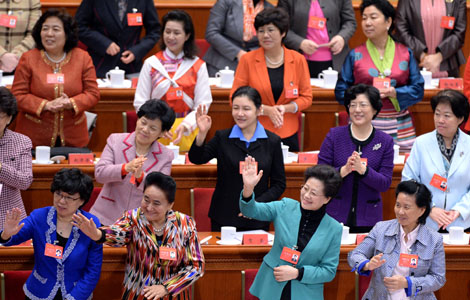
 Women's congress aims to close income gap, lift status
Women's congress aims to close income gap, lift status
 Sao Paulo Fashion Week held in Brazil
Sao Paulo Fashion Week held in Brazil
 Serena beats Li Na for WTA title
Serena beats Li Na for WTA title
 Nuclear submarine fleet comes of age
Nuclear submarine fleet comes of age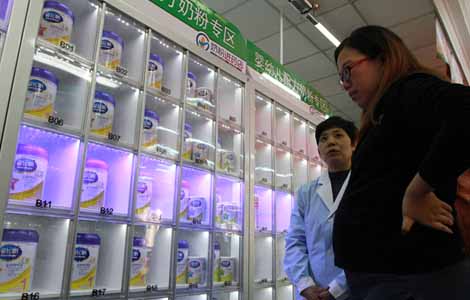
 5 pharmacies begin to sell baby formula
5 pharmacies begin to sell baby formula
 The suave style of America's dapper dynasty has arrived
The suave style of America's dapper dynasty has arrived
Most Viewed
Editor's Picks

|

|

|

|

|

|
Today's Top News
Penn State: 26 people get $59.7m over Sandusky
Obama aware of spying on Merkel: German paper
China providing space training
Miscommunication causes conflicts
Accident in Tian'anmen kills 5
US-China CEO's Dialogue held in Washington
3 die after car crash at Tian'anmen Square
ABC apologizes for offensive words on Chinese
US Weekly

|

|
